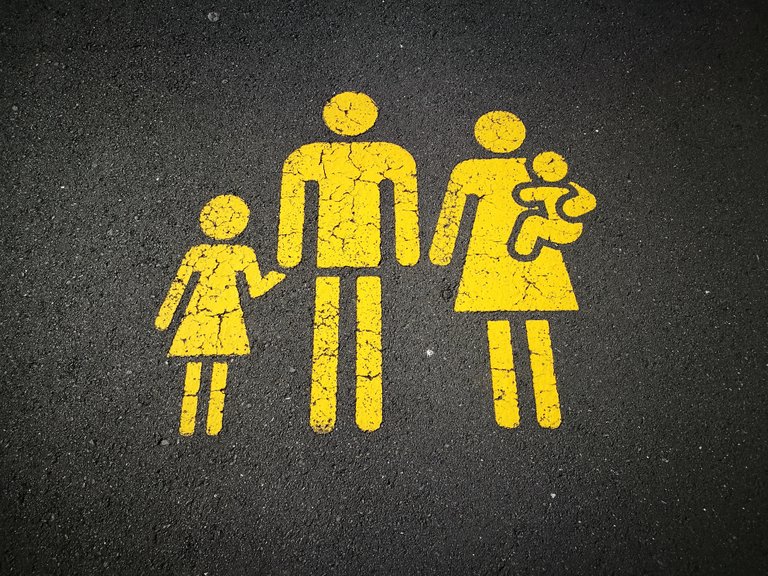 Image by mohamed Hassan from Pixabay
Image by mohamed Hassan from Pixabay
It's no longer a hidden phenomenon. Most people are well aware of the degradation of the father dynamic within families. The "deadbeat dad" has become a commonplace term for fathers who fail to pay child support. While this sounds bad on the surface, the entire deadbeat dad diatribe is a myth.
Are there deadbeat dads out there? Sure. Are they prevalent? Not even close. The sad fact of the matter is that family law is a multi-billion dollar empire, built on the ashes of families. To make matters worse, the system is rife with blatant violations of due process, debtors' prisons, and legalized extortion. The straw that broke the camel's back and ensured the enforcement of these acts for the foreseeable future, is known as Social Security Title IV-D.
What does a system designed to help retiring individuals facilitate a continuing income have to do with family law? As it turns out, an awful lot.
What is Social Security Title IV-D?
 Photo by Kelly Sikkema on Unsplash
Photo by Kelly Sikkema on Unsplash
Social Security Title IV-D is a federal program that provides a dollar-for-dollar match to states for every dollar the state collects in child support. Originally, this was intended to provide federal grants to states to provide welfare benefits to single mothers. The problem is, like all "good intention" legislation, that's not where it ends.
For one, states can file waivers and spend the money however they like. For two, it's a funding incentive for states to maximize child support. There are two ways this is accomplished. The first is simply telling the father he has to pay (insert amount here) per month, with an absolutely ludicrous sum. The second, and the far more insidious method, is to minimize the father's time with his children.
It sounds ludicrous but think about it like this—the less time a father has with his children, the more money the state can order in child support. It's really that simple and you can see how easily this would sway the state towards destroying a father's connection with his children to maximize child support, therefore maximizing the amount of money the state can bring in from the federal government.
Courts base child support on gross income, not net
 Photo by Giorgio Trovato on Unsplash
Photo by Giorgio Trovato on Unsplash
Let's say a father makes $60,000 per year. Break that down into weekly paydays and you get $1,153/week. Sounds pretty decent for a middle-income father. Federal income taxes, including social security and medicare, come to $6,187. To keep it simple, let's say the father lives in Florida and has no state income tax to deal with. Now, take out 401k contributions of $10,000.
Take out health insurance at a very kind $250/mo and dental insurance at $25/mo. Now, this father is down to $40,513, which comes to $779/week. The power bill is $200, rent or mortgage is $750 (once again, being kind). Water and garbage are $70. The cell phone bill is $50. Disposable income is now down to $27,673, which is $533/week.
Now, we're assuming that the dad doesn't have cable/internet, no outstanding medical debts, no college payments, no outstanding dental debts, and no current mechanical issues to pay for regarding a vehicle. We also haven't included food, simply because the dynamic of food costs per month is all over the board. However, it's easy to draw a picture here, since most of us currently live or have lived something similar.
In the state of Alabama, if the mother has a below-poverty line income, the father will be hit with $894 per month, per child. Despite popular political perspectives, the above situation happens far more often than you would think. That's by design. It's what happens when you're incentivized to stay home and collect a paycheck.
The state loves it and they really love it when struggling fathers get behind. Take California for example. The state of California pays itself when child support payments and arrearages roll in. A very small amount of the remaining money Cali doesn't use goes to the county in which the custodial parent lives.
While California certainly indulges in this "in-your-face" theft, don't assume that other states don't do the exact same thing on a smaller scale.
Denouncing Deadbeat Dads Has Become a Moral Tradition
 Photo by Caleb Jones on Unsplash
Photo by Caleb Jones on Unsplash
The state doesn't care if you've been laid off. They don't care if your income has changed in a negative way. Sure, you can file the paperwork to alter the child support due each week but it's a slow-crawl process, and it's at the court's discretion whether or not payments should be reduced. Ultimately, the child support owed continues to accrue.
The statistics don't lie. Dads pay more child support, more often than mothers do (the 15% or so of moms who don't have custody). However, dads who struggle to pay are labeled "deadbeat dads." The label is used so often and mostly in circumstances in which it doesn't apply, that the deadbeat dad label has become a moral tradition.
The state will incarcerate a father who is late on child support payments and the "why" does not matter. States want that federal money and if they have to throw a struggling father in jail, it will be done. The fact that a debtor's prison is absolutely illegal and unconstitutional in this country is irrelevant. You will pay. It does not matter if you have the ability to pay or are struggling to put food on the table. You will pay. You will pay now. States love a dad in arrears because when he finally pays, 100% of that money is entirely up to the state in how it is distributed or if it even is distributed.
Worse yet, child support enforcement disproportionately affects black fathers. One-eight of all prison inmates in South Carolina are in prison over a failure to provide child support payments. Most are African American. Walter Scott, a father of four, was killed by police officers who were serving a warrant on $6,800 in child support due. How much money are his kids going to receive now?
You might ask, If they don't pay child support, then they really are deadbeat dads, right? The reality is, most dads try. According to the Journal of Marriage and Family, dad's who can't pay, do everything they can to provide support in whatever way they can. This includes diapers, formula, clothes, shoes, and other essential items. Of course, the state doesn't care. They can't collect federal money when you pay in baby shoes and diapers.
Child support payments are all too frequently set at rates that are unpayable, can only be paid in smaller portions, or are doomed to go unpaid the first time a struggling father has a personal emergency to deal with.
Fathers bear the brunt of gender bias in courts
 Photo by Sandy Millar on Unsplash
Photo by Sandy Millar on Unsplash
And it's all about the benjamins. Studies show, over and over again, that fathers are frequently tossed to the side in favor of mothers in court. If you think it's truly about gender, it's not. It's mostly about which individual they can make the most money from. Fathers are kicked to the curb based on legislation that is over 50 years old. The "child's best interest" guidelines are ancient and do not reflect the times we live in today.
A study conducted on 1,000 divorced couples determined that mothers were awarded custody at a rate of four times that of fathers. The rate of custody going to mothers in the state of Virginia is 95%. A study conducted in Ohio determined that of all the fathers seeking custody in court, only 10% received it.
Child Support is a federally-funded welfare program that's not for children
 Photo by Annie Spratt on Unsplash
Photo by Annie Spratt on Unsplash
The Social Security Title IV-D program is another program that was instituted under the guise of "good intentions." It was never intended to be something worthwhile for single mothers. If you need any more evidence to support that statement, look no further than the program itself. It is the only welfare program that has zero income eligibility limitations. That last statement is everything you need to know about a program designed to wield immense power over families, their destruction, the ostracization of the father, the power granted to the state, and the money that rolls in.
Child support should be a method of support for a child that comes from both parents and nothing more. Every time the state gets involved, things go sideways. If you ever need any proof of that, visit your local DMV. There needs to be a system of accountability and support, while the states are shunted to the side in terms of any financial incentives or gains. The current system is unsustainable, both in terms of micro-economies and family cohesion.
- The current system facilitates unconstitutional debtor's prisons
- It destroys financial support systems
- It disregards the reality of economic situations following divorce
- It removes the ability of fathers to be productive members of society
- The system ignores various support initiatives in favor of a purely financial contribution
Whether you're a father or a mother, you can't ignore the consequences of continuing to facilitate the evolution of this failed structure. Until we stop acknowledging the status quo, fathers (in the vast majority of cases) will continue to suffer the consequences of federal and state greed. When fathers suffer, children suffer, whether we appreciate looking at it from that angle or not. Social Security Title IV-D is a broken, invasive, and insidious blow to fathers across the country and states will continue to reap the rewards as they destroy one family after another.
~~~ embed:1584000413837115392 twitter metadata:NjI2ODAwNDU2fHxodHRwczovL3R3aXR0ZXIuY29tLzYyNjgwMDQ1Ni9zdGF0dXMvMTU4NDAwMDQxMzgzNzExNTM5Mnw= ~~~
The rewards earned on this comment will go directly to the people( @steemseph ) sharing the post on Twitter as long as they are registered with @poshtoken. Sign up at https://hiveposh.com.
Yay! 🤗
Your content has been boosted with Ecency Points, by @tdgodwin3780.
Use Ecency daily to boost your growth on platform!
Support Ecency
Vote for new Proposal
Delegate HP and earn more
Interesting and thought provoking article. Thank you.
The worst, it takes time to change a judgment. How much money do you need to pay as child support, for example, if your situation has changed recently?
Typically, the courts try to milk the maximum out of you because the state makes more money that way. But every state is different. In my circumstance, it’s Alabama and they combine my gross income with my exe’s gross income and make their calculations based on that. Since she makes all of her money under the table, she is able to report $8,500 gross annual income. So, even if my income were to drop from $60k a year to $30k a year, my child support obligations would not be cut in half. They would only drop it by a few percentage points because she’s “technically” at the lowest bracket of the poverty level, even though she brings in around $40k under the table per year. But Alabama is under no obligation to lower my child support. If I tried, my ex would almost certainly argue “the best interests of the child.” And my daughter’s “best interests” would be to continue child support at the same level because she is used to that income level. I currently pay $135/week for my only child and I’m obligated to drive the entire 3 and a half hour round trip to pick my daughter up on the weekends. It amounts to about $1200 a month for the last 10 years. I believe in taking responsibility and caring for my daughter, giving her every opportunity to have a better life than me, but the courts are more interested in federal dollars than they are the father’s ability to pay.
It is crazy that the system milk this way. I hope you can afford to pay less in a distant future and get a better life with your daughter.